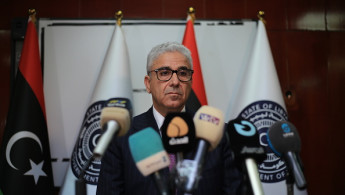Libyan MPs take aim at UK ambassador over GNU support
Some 53 members of Libya's House of Representatives have signed a statement accusing the British ambassador to the country of interfering in Libyan affairs after she spoke on television of her work with the rival Tripoli-based Government of National Unity (GNU).
The Tobruk-based body said Friday that Ambassador Caroline Hurndall was "interfering in Libyan private affairs, and disrespecting Libya’s sovereignty" through her comments on work she said during an interview with Al Jazeera earlier this week was done in a "consensual context".
"The consent the ambassador is talking about has no legal or democratic basis. Their government has not been ratified by the House of Representatives - who rejects their legitimacy and decisions," the house members said in their statement.
Taking aim at GNU leader Abdulhamid Dbeibah, the MPs said that "the ambassador has shown her complicity with a leader that is trying to impose power by force," and alleged that she has "tacitly disrespected the will of the Libyan people".
They accused Hurndall of conducting "illegal meetings and communications with local actors, without consent of the government, trying to interfere in security arrangements, and attempting to derail the work of the joint military council".
The New Arab has contacted Hurndall for comment on the House of Representatives statement.
#صور: #بيان ال 53 نائبا في #مجلس_النواب حول تصريحات السفيرة البريطانية #كارولين_هاولندال وتدخلها في الشأن الداخلي #ليبيا pic.twitter.com/6D3JMBIups
— ليبيا لحظة بلحظة (@3dhzn) August 12, 2022
This is the second time the House of Representatives has spoken out against Hurndall, who was appointed Ambassador to Libya in September 2021.
In December of last year, the Tobruk-based parliament declared her a "persona non grata in Libya" after she announced her commitment to the work of the GNU after failed elections three days prior.
The GNU was appointed as part of a United Nations-backed peace process to end more than a decade of violence in the North African country.
The transitional government had a time-limited mandate to lead the country to elections last December, but they never took place due to divisions over the rules and the presence of controversial candidates.
The UN's Libya advisor and Western countries have said that the GNU, installed a year ago through a UN-backed process, remains valid, and have urged the parliament to focus instead on bringing elections forward.
The House of Representatives is seeking to take control of Libya's political future after the collapse of an election that was planned for December, saying the GNU is no longer valid and pushing any new election back until next year.
The UN's Libya advisor and Western countries have said the GNU remains valid, and have urged the parliament to focus instead on bringing elections forward.
Libya has been gripped by insecurity since a NATO-backed uprising toppled and killed dictator Muammar Gaddafi in 2011, leaving a power vacuum armed groups have been wrangling for years to fill.





 Follow the Middle East's top stories in English at The New Arab on Google News
Follow the Middle East's top stories in English at The New Arab on Google News


